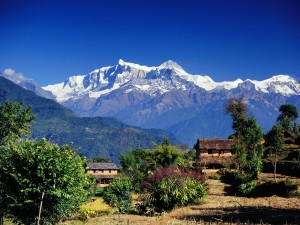[soundcloud id=’203282152′]

Nepal is a very mountainous area situated next to China and India. There are many valleys and hills that are standing in the way of relief efforts. The town pictured here is Gandaki, Annapurna in Nepal. (Photo by Adarsh Thakuri via Flickr)
By Reid DiRenzo
A circle of students and community members formed at the University of Connecticut on Fairfield way Wednesday night for a candle lit vigil to mourn and remember those lost and affected by the Nepal earthquake disaster.
The vigil was hosted by the UConn Nepali Student Association with speakers ranging from members of the Nepali Student Association to Elizabeth Paterson, the Mayor of Mansfield, as well as UConn faculty members. Many of the speakers had connections to Nepal and had family members affected by the disaster.
Abhishek Thakur, president of the UConn Nepali Association, was among those.
“Saturday morning I got a call from my mom she was sobbing and telling me about what’s going on back at home. I heard a lot of very bad stories about buildings falling down on my neighbors and just a lot of people dying, and a lot of people losing water just the essentials of life. So that really motivated us as a group to get some money and send it out and help those people out,” Thakur said.
The most recent estimates of those dead have topped 4,600 as a result of the 7.8 magnitude earthquake that shook the capital Kathmandu and surrounding towns on Saturday April 24, 2015.
“The villages around the valley are kind of hard to reach because it’s only reachable by roads. So at this moment there are a lot of landslides around the roads therefore there have been a lot of blockages so it’s been very hard.”
That was Yerina Ranjit, a UConn graduate student, who came out to the event in order to support her family back in Nepal who survived the earthquake. Ranjit frantically tried to get in contact with her family over the weekend.
“What little information we could get was through Facebook initially, then finally some of the mobile lines were on and we were able to get in touch with them eventually, but we’ve been trying to keep in touch through VoIP apps like Viper and Skype,” Ranjit said.
Ranjit’s family ended up surviving the earthquake, but many were not so lucky. Many students shared common stories of difficulties contacting their families and anxiously waiting to hear back from their loved ones. For many, like Ranjit, social media was the main source of contact as well as phone applications.
Efforts to try to send food and support for survivors are still ongoing, but remote towns in the mountains still have not been reached. The Napelese government admitted that they were not equipped to handle the large-scale disaster making International aid and donations from organizations essential in order to provide many basic necessities like food, water medical supplies and blankets to the Nepalese towns.
Speakers at the vigil sent out urgent requests for donations of any denomination or any basic necessities like tents, gloves and medical supplies.
“For the students here I think all of us feel so helpless. We need something to do. I know a lot of kids are so gung ho about going and helping, but it’s a disaster zone and we have no training there’s nothing we can do. But I think a vigil we get to have something where we want them to know they’re thinking of them.”
That was Shushrusha Lamsal, the Pan Asian Council Representative for the event who will be vice president next year. While her immediate family lives in the United States, the rest of her family lives back in Nepal, but survived the disaster.
“I think sending money out with people you know or even sending money out with organizations like the Nepali Red Cross is a good option because they are reliable and you know they are going to do the right thing with it,” Thakur said.
Student Sahara Shrestha says her aunt and other family have been displaced by the disaster and could benefit from aid and resources.
“They’re living downstairs in a basement with just blankets, there’s barely any food, no electricity so it’s hard to reach her, but I got a hold of my family in town and they’re all safe and I was really grateful that they were all safe,” Shrestha said.
Despite the dropping temperatures and windy conditions attendees stood to support those affected by the disaster. The night concluded with lighting tea lights that spelled out the words Nepal and donations were accepted with great appreciation.

